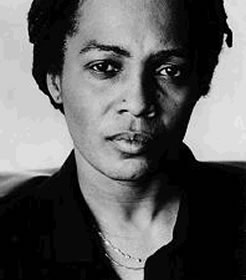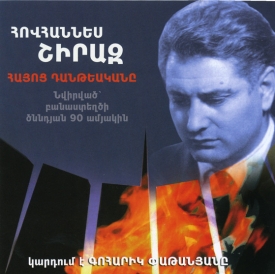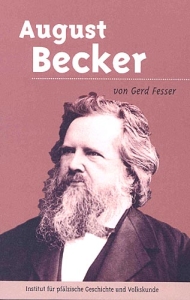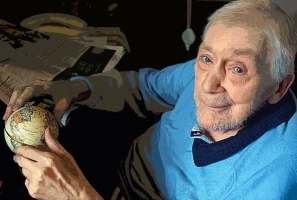De Surinaamse dichteres en schrijfster Astrid Roemer werd in Paramaribo geboren op 27 april 1947. Zie ook alle tags voor Astrid Roemer op dit blog.
Hoeveel huid heb je
maagdelijk gehouden om te strelen
om ook mij te warmen
hoeveel zicht heb je nog
op de donkere kamer van je
archief waarin sporen van ons en
reikt je gehoor ver genoeg om te ervaren
dat alles eindeloos beweegt van mij af
sinds ik naar jou
toe nou: ruik het bloed dat spat uit mijn
zevenmijlslaarzen
de verbloemde adem van nog een gloed-
nieuwe dag te lang
monddood
ach ik weet het, mijn lief: je hebt
de smaak te pakken gekregen van een bestaan
dat je tegen-
staat weiger
niet als slotstuk nog mij te
beproeven.
frustratie
spiraal van leven
maakt me
lang
doorzichtig
dun
ik glijd poreuze
vlakten
in
bloedrode misdaad
gelige liefde
zwarte wanhoop
zilveren
korruptie
poreus leven
ik
zonder bloed
zonder ziel
geen doel
gemaakt door
spiraal van leven
begrijp alles
kan leven

Astrid Roemer (Paramaribo, 27 april 1947)
De Armeense dichter Hovhannes Shiraz werd geboren op 27 april 1915 in Alexandropol in het toenmalige Russische rijk (tegenwoordig Gyumri). Zie ook alle tags voor Hovhannes Shiraz op dit blog.
Snow falls
Snow falls,
flutters down
like angel-wing feathers
upon my mother’s grave.
Snow falls,
piles high
like a tombstone
on the distant grave.
Snow falls,
and God gently lays
snow flake upon snow flake
so that my mother,
pained long ago by Life,
will not hurt again.
Snow falls,
and turns to marble.
God Himself
carves my mother’s tombstone.
Vertaald doorKnarik O. Meneshian

Hovhannes Shiraz (27 april 1915 – 14 maart 1984)
De Duitse schrijver August Becker werd geboren op 27 april 1828 in Klingenmünster. Zie ook alle tags voor August Becker op dit blog.
Uit: Es geht um
Und der Kontrolleur begann, beschwichtigt, sich das Kinn zu streicheln und den Zimmerboden zu betrachten, während der Doktor fortfuhr: »Ein angesehener junger Mann, ein hübscher junger Mann…«
»Bitte recht sehr, Herr Doktor! Bitte!«
»Ein junger Mann mit den schönsten Aussichten, aber ein Beamter – und gar von drüben herüber! Sie können voll Gold hängen, und kämen doch nicht an. Wissen Sie, wie man euch Altbayern – Sie sind aus dem Bayreuthschen, ich weiß, weiß, gleichviel – man hat euch alle auf dem Strich!«
»Aber warum denn?«
»Warum! Fragen Sie lang, warum! Man sieht alle Stellen mit euch besetzt, man verabscheut die Maut, man stellt sich in Opposition, man jubelt der Linken im Landtag zu, kurz, man regt sich auf. In Zweibrücken und sonst gärt’s unter Bürgern und Beamten.
»Ah«, sagte der Kontrolleur, »was soll denn gären?«
»Es gärt«, versicherte Doktor Flax. »Meinen Sie, der Siebenpfeiffer gibt Ruh? Da kennen Sie ihn schlecht. Geben Sie acht, ob’s nicht bald losgeht wie voriges Jahr in Paris, Brüssel, Braunschweig, Warschau. Man hat die rote Kappe schon in der Tasche. Und wenn die Freiheitsbäume in die Höhe wachsen, na! Ich möcht’ Ihren Kopf nicht auf meinen Schultern sitzen haben. Fühlen Sie ihn nicht wackeln? He? Wir wohnen hier in einer heißen Ecke, müssen Sie wissen, auf der Hackmesserseite. Nehmen Sie sich in acht, Herr Kontrolleur. Und wenn die Burschen von Oberhofen hören, was Sie herführt, na! Die Hiebe! In Ihrer Haut möcht’ ich nicht stecken!«

August Becker (27 april 1828 – 23 maart 1891)
De Franse schrijver en dichter Jules Lemaître werd geboren op 27 april 1853 in Vennecy, Loiret. Zie ook alle tags voor Jules Lemaître op dit blog.
La Lyre d’Orphée
… A sa voix se leva le prince des Aèdes,
Et son Luth animé, plein de souffles ardents,
Si douloureusement vibra sous ses doigts raides,
Que les tigres rayés et les lions grondants
Le suivaient, attendris, et lui faisaient cortège,
Doux, avec des lambeaux de chair entre les dents.
Choeur monstrueux conduit par un divin Chorège !
Les grands pins, pour mieux voir l’étrange défilé,
En cadence inclinaient leurs fronts chargés de neige.
Les gouttes de son sang sur le Luth étoilé
Brillaient. Charmant sa peine au son des notes lentes,
L’Aède, fils du ciel, se sentit consolé :
Car tout son coeur chantait dans les cordes sanglantes.
Jules Lemaître (27 april 1853 – 5 augustus 1914)
De Schotse dichter en vertaler Edwin Morgan werd geboren in Glasgow op 27 april 1920. Zie ook alle tags voor Edwin Morgan op dit blog.
Seven Decades
At ten I read Mayakovsky had died,
learned my first word of Russian, lyublyu;
watched my English teacher poke his earwax
with a well-chewed HB and get the class
to join his easy mocking of my essay
where I’d used verdant herbage for green grass.
So he was right? So I hated him!
And he was not really right, the ass.
A writer knows what he needs,
as came to pass.
At twenty I got marching orders, kitbag,
farewell to love, not arms, (though our sole arms
were stretchers), a freezing Glentress winter
where I was coaxing sticks at six to get
a stove hot for the cooks, found myself picked
quartermaster’s clerk – ’this one seems a bit
less gormless than the bloody others’ – did
gas drill in the stinging tent, met
Tam McSherry who farted at will
a musical set.
At thirty I thought life had passed me by,
translated Beowulf for want of love.
And one night stands in city centre lanes –
they were dark in those days – were wild but bleak.
Sydney Graham in London said, ‘you know
I always thought so’, kissed me on the cheek.
And I translated Rilke’s Loneliness
is like a rain, and week after week after week
strained to unbind myself,
sweated to speak.
At forty I woke up, saw it was day,
found there was love, heard a new beat, heard Beats,
sent airmail solidarity to Saõ
Paulo’s poetic-concrete revolution,
knew Glasgow – what? – knew Glasgow new – somehow –
new with me, with John, with cranes, diffusion
of another concrete revolution, not bad,
not good, but new. And new was no illusion:
a spring of words, a sloughing,
an ablution.
At fifty I began to have bad dreams
of Palestine, and saw bad things to come,
began to write my long unwritten war.
I was a hundred-handed Sindbad then,
rolled and unrolled carpets of blood and love,
raised tents of pain, made the dust into men
and laid the dust with men. I supervised
a thesis on Doughty, that great Englishman
who brought all Arabia back
in his hard pen.
At sixty I was standing by a grave.
The winds of Lanarkshire were loud and high.
I knew what I had lost, what I had had.
The East had schooled me about fate, but still
it was the hardest time, oh more, it was
the worst of times in self-reproach, the will
that failed to act, the mass of good not done.
Forgiveness must be like the springs that fill
deserted furrows till they wait
until – until –
At seventy I thought I had come through,
like parting a bead curtain in Port Said,
to something that was shadowy before,
figures and voices of late times that might
be surprising yet. The beads clash faintly
behind me as I go forward. No candle-light
please, keep that for Europe. Switch the whole thing
right on. When I go in I want it bright,
I want to catch whatever is there
in full sight.

Edwin Morgan (27 april 1920 –19 augustus 2010)
Zie voor nog meer schrijvers van de 27e april ook mijn twee blogs van 27 april 2011.
